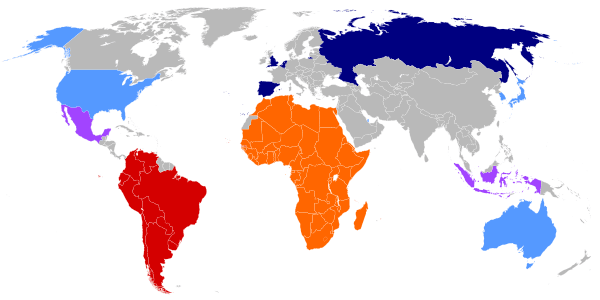Royal Spanish Football Federation
The Royal Spanish Football Federation (Spanish: Real Federación Española de Fútbol; RFEF) is the governing body of football in Spain. It is based in La Ciudad del Fútbol of Las Rozas, a municipality near Madrid. It was founded on 14 October 1909 as Federación Española de Clubs de Football,[1] and officially founded on 29 September 1913.[2]
| UEFA | |
|---|---|
 | |
| Founded | 14 October 1909 (as Federación Española de Clubs de Football) 29 September 1913 |
| Headquarters | Madrid |
| FIFA affiliation | 1904 |
| UEFA affiliation | 1954 |
| President | Luis Rubiales |
| Website | rfef.es |
It administers the competition committee (including the handling of the trophy) of the Campeonato Nacional de Liga: the Primera División and the Segunda División, even though they are organized by LaLiga. It organizes the Segunda División B as well as the Tercera División with the assistance of the regional football federations.
It is also responsible for appointing the management of the Spanish national football team (men's), women's, and youth national football teams. The Spain national futsal team, also belongs to the federation. As of May 2019, the federation has 21,148 registered clubs and 1,063,090 federated football players.[3]
Competitions
The RFEF also organizes several competitions:
- National cups:
- Copa de S.M. el Rey
- Supercopa de España
- Copa Federación
- Women's competitions:
- Primera División Femenina
- Segunda División Femenina
- Copa de la Reina
- Youth competitions:
Honours
National youth teams
Men
|
Women
|
Territories
The RFEF consists of 19 regional and territorial federations, comprising the different Autonomous communities and cities in Spain.
- Andalusia: Federación Andaluza de Fútbol (FAF)
- Aragon: Federación Aragonesa de Fútbol
- Asturias: Real Federación de Fútbol del Principado de Asturias
- Balearic Islands: Federació de Futbol de les Illes Baleares
- Basque Country: Federación Vasca de Fútbol / Euskadiko Futbol Federakundea
- Canary Islands: Federación Canaria de Fútbol (FCF)
- Cantabria: Federación Cántabra de Fútbol
- Castile and León: Federación de Castilla y León de Fútbol
- Castile-La Mancha: Federación de Fútbol de Castilla-La Mancha
- Catalonia: Federació Catalana de Futbol
- Ceuta: Federación de Fútbol de Ceuta
- Community of Madrid: Federación de Fútbol de Madrid (FFM)
- Extremadura: Federación Extremeña de Fútbol
- Galicia: Federación Gallega de Fútbol
- La Rioja: Federación Riojana de Fútbol
- Melilla: Federación Melillense de Fútbol
- Region of Murcia: Federación de Fútbol de la Región de Murcia (FFRM)
- Navarre: Federación Navarra de Fútbol
- Valencian Community: Federación de Fútbol de la Comunidad Valenciana
Presidents
| President | Years in power |
|---|---|
| Francisco García | 1913–1916 |
| Gabriel Maura | 1916–1920 |
| David Ormaechea | 1921–1923 |
| Gabriel Maura | 1923–1924 |
| Julián Olave | 1924–1926 |
| Antonio Bernabéu | 1926–1927 |
| Pedro Díez de Rivera (Marqués de Someruelos) | 1927–1931 |
| Leopoldo García | 1931–1936 |
| Julián Troncoso | 1939–1940 |
| Luis Saura | 1940–1941 |
| Javier Barroso | 1941–1946 |
| Jesús Rivero | 1946–1947 |
| Armando Muñoz Calero | 1947–1950 |
| Manuel Valdés | 1950–1952 |
| Sancho Dávila | 1952–1954 |
| Juan Touzón | 1954–1956 |
| Alfonso de la Fuente | 1956–1960 |
| Benito Pico | 1960–1967 |
| José Luis Costa | 1967–1970 |
| José Luis Pérez-Paya | 1970–1975 |
| Pablo Porta | 1975–1984 |
| José Luis Roca | 1984–1988 |
| Ángel María Villar | 1988–2017 |
| Juan Luis Larrea | 2017–2018 |
| Luis Rubiales | 2018– |
References
- EFE (7 March 2010). "Le quiere quitar cuatro títulos históricos al Madrid y uno al Barcelona". Marca (in Spanish). Retrieved 4 December 2010.
- "Adidas presentó la nueva equipación de España". Real Federación Española de Fútbol (in Spanish). Archived from the original on 8 March 2012. Retrieved 4 December 2010.
- "Yearbook of Sports Statistics 2019" (PDF). www.culturaydeporte.gob.es. Ministry of Culture and Sport. May 2019. pp. 112 and 122.
External links
- Official website RFEF (in Spanish)
- Spain at FIFA site
- Spain at UEFA site


